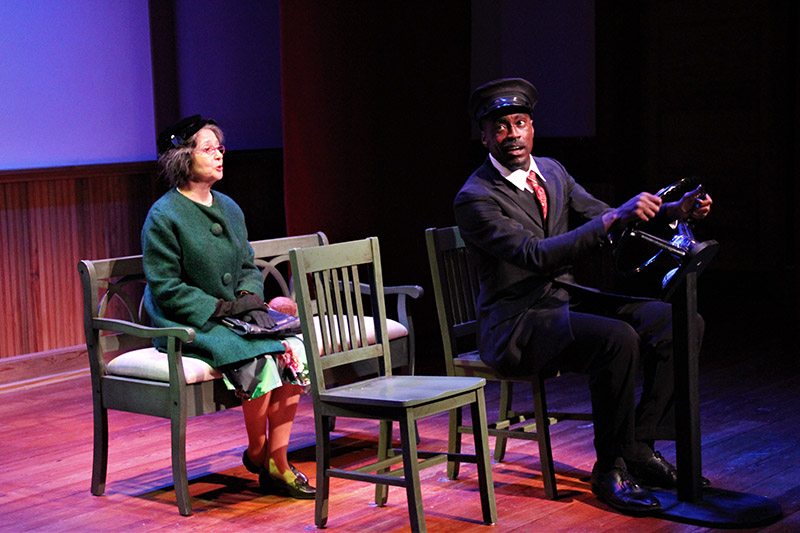Bonnie Black and Rob Karma Robinson in “Driving Miss Daisy.”
The tragic element of a revival of the 1987 off-Broadway hit “Driving Miss Daisy,” about racial and class and ethnic tensions in Atlanta, Ga., from the critical years of 1948 through 1972, is that nothing is dated. It’s all still happening; it’s all still true. As our new era of divisive politics has kicked up insurgencies of racism and anti-Semitism that some of us were naive enough to think had faded away, the stunning topicality of this Pulitzer prizewinning play breaks one’s heart.
The French have noted for absolute eons, “Plus ça change, plus c’est la meme chose” — the more things change, the more they stay the same. My dad, who’d lived through the Depression, stormed the Normandy beaches in WWII, and endured all the other quirky evil that defined the last decades of the old millennium, always used to repeat that phrase. He shortened it to a wistful, “Plus ça change.” I used to think, “But things have improved!” But now, who knows?
Most of us were introduced to “Driving Miss Daisy” by the 1989 movie. The film version had a slow box office start, then gained momentum. It vacuumed up 9 Oscar nominations and awards, including winning Best Picture. All at once, it was a must-see movie, with superb acting — Jessica Tandy, Morgan Freeman (who originated his role off-Broadway), and Dan Aykroyd. Snappy dialogue keeps things lively, while a whole lot of subterranean class tension plays out with every shared glance and offer of tea.
MJ Bruder Munafo, artistic director of the Martha’s Vineyard Playhouse, and director of this final play of the summer season, as always, brings ingenuity to the casting. The youngest character — the exacting Miss Daisy’s put-upon son (Marc Carver) — is 40. Daisy (Bonnie Black) is 72, her chauffeur-to-be (Rob Karma Robinson) not far behind her in age. They spend the next 25 years of the story continuously aging; an acting marvel. Later, when you descend the wide stars of the playhouse and check out the actors’ CVs and photos on an easel in the lobby, you can’t help blurting out, “They’re so young! And hot!” Which is neither here nor there, other than to say their youth reveals hidden skill sets in their acting.
The reason this play works so well is that you know from the start you’re in good hands with playwright Alfred Uhry’s crisp dialogue. Also, the drama starts with a bang: Miss Daisy has just smashed up her three-week-old Packard. In her garage.
“It was the car’s fault!” she protests to son Boolie, a successful Atlanta businessman.
“You demolished the Packard all by yourself,” he informs her. He stands his ground on this classic intervention: No more car for his “Doodle Mama,” as he calls her when affection blends with ire. Aside from the hazard to herself and innocent citizens beyond her driveway, no insurance company in America will give her a new policy. Time to hire a driver. Boolie will canvas “every colored man in Atlanta” to find her a chauffeur.
A relationship ensues between the cocky and yet empathetic driver, Hoke, and the barbed-tongued Miss Daisy. The greatness of the play is how the two-and-a-half-decade relationship reflects Jim Crow days evolving into the civil rights era, and how the two antagonists become best friends, without any direct way to express this essential bond other than to hold hands as a dementing 97-year-old Daisy hangs on for dear life when Hoke visits her in the nursing home.
The tensions of race in the South over those years are, assumably, what we chiefly remember about “Driving Miss Daisy,” culminating in Doodle Mama buying tickets for a Martin Luther King Jr. banquet, to be hosted by United Jewish Appeal. She invites Boolie, who shudders as he has to turn her down. There are plenty of businessmen in town who’ll slowly back away from him if he reveals overt interest in civil rights.
Race issues ring so prominently in this drama that we may have forgotten anti-Semitism flaring up during the same era. At one point Hoke and Daisy are stuck in traffic. He checks out the problem, and returns ruefully to tell her the temple to which he drives her for services has been bombed. Plus ça change, huh?
Playwright Uhry, who also penned the screenplay, produced a trilogy about Jewish families in Atlanta; “Miss Daisy” is part of the set. The crusty, contrarian Southern matriarch was based on his grandmother, a Jewish woman who also crashed her car, and for whom a black driver was hired. When Hoke tells Daisy about the bombed temple, she’s shocked that anyone would think of hurting Jews. “We’re a Reformed temple!” she protests, as if any denomination of Jews is beyond reproach from hate groups. When Hoke implies that her tribe’s suffering are akin to his own, she rejects the premise.
And yet they do draw closer. A revival of “Miss Daisy” keeps the conversation fresh, about race and class tensions, and what we truly want for ourselves and our country, which is for all of us to keep talking about.
Scenic design is by Lisa Pegnato; costumes by Cynthia Bermudes; lighting, Jeffrey E. Salzberg; sound and projections design, J.B. Lamont; properties Mona Hennessy, and stage manager Christine Lomaka; in other words, all the usual talented suspects at the playhouse.
“Driving Miss Daisy” runs through Oct. 7. Book your tickets at mvplayhouse.org or call 508-693-6450.
This story by Holly Nadler originally appeared on mvtimes.com.




